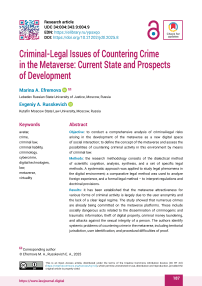Criminal-Legal Issues of Countering Crime in the Metaverse: Current State and Prospects of Development
Автор: Efremova M. A., Russkevich E. A.
Журнал: Journal of Digital Technologies and Law @lawjournal-digital
Статья в выпуске: 3 (2), 2025 года.
Бесплатный доступ
Objective: to conduct a comprehensive analysis of criminal-legal risks arising in the development of the metaverse as a new digital space of social interaction; to define the concept of the metaverse and assess the possibilities of countering criminal activity in this environment by means of criminal law. Methods: the research methodology consists of the dialectical method of scientific cognition, analysis, synthesis, and a set of specific legal methods. A systematic approach was applied to study legal phenomena in the digital environment; a comparative legal method was used to analyze foreign experience, and a formal legal method – to interpret regulations and doctrinal provisions. Results: it has been established that the metaverse attractiveness for various forms of criminal activity is largely due to the user anonymity and the lack of a clear legal regime. The study showed that numerous crimes are already being committed on the metaverse platforms. These include socially dangerous acts related to the dissemination of criminogenic and traumatic information, theft of digital property, criminal money laundering, and attacks against the sexual integrity of a person. The authors identify systemic problems of countering crime in the metaverse, including territorial jurisdiction, user identification, and procedural difficulties of proof. Scientific novelty: a comprehensive analysis of the criminal-legal aspects of the metaverse functioning was performed. The article formulated theoretical approaches to the qualification of crimes committed in the virtual space. The work substantiates the need to develop special legal structures for regulating relations in the metaverse. The authors proposed a concept of a multidimensional model of legal protection of relations in the metaverse based on public-private partnership. Practical significance: the study results can be used in improving criminal legislation in terms of regulating responsibility for crimes committed in the digital space. The work may help to develop the concept of legal regulation of the metaverse and to create mechanisms for public-private partnership in the field of countering cybercrime. The findings are relevant for law enforcement practice in the investigation of crimes committed using virtual reality technologies.
Avatar, crime, criminal law, criminal liability, criminology, cybercrime, digital technologies, law, metaverse, virtuality
Короткий адрес: https://sciup.org/14132936
IDR: 14132936 | УДК: 34:004:343.9:004.9 | DOI: 10.21202/jdtl.2025.8


